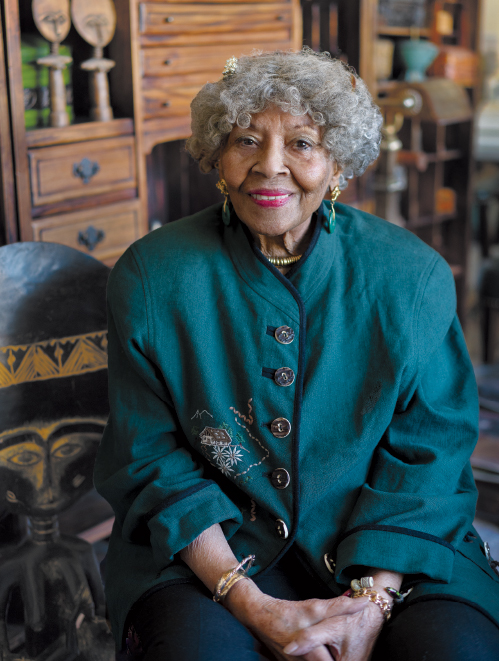This year’s recipients of Wellesley’s highest honor are Adelaide Hines Sanford, M.A. ’50, Robin Chase ’80, and Farhana Khera ’91.
Photo by Bruce Weller
Adelaide Hines Sanford, M.A. ’50
Talk to people who know Adelaide Hines Sanford, M.A. ’50, and you hear words like “icon” and “hero.” Within New York education circles, she’s often referred to as a living legend.
Sanford, 95, is a scholar, activist, and one of the nation’s foremost advocates for the education of students of African ancestry.
“You cannot talk to a Black public school educator of note in New York state who hasn’t been impacted by Dr. Sanford’s legacy,” says Mark Winston Griffith, executive director of the Brooklyn Movement Center, a Black-led community organizing group based in central Brooklyn, N.Y. “Dr. Sanford was more than more than a public school teacher and administrator. She was a revolutionary, disrupter, and iconoclast who, oxymoronically, worked within the system.”
Sanford realized early on that “the system,” which often labeled Black children, particularly those in urban areas, as “disadvantaged,” “at-risk,” or “culturally deprived,” needed reforming. She also learned that you can’t help students without first helping their parents and educating them about how to advocate on behalf of their children, schools, and teachers.
Sanford’s more than 50-year career in public education—from classroom teacher to vice chancellor of the New York State Board of Regents—provided her a unique position from which to view and experience the entire educational landscape.
Sanford says she didn’t necessarily set out to become a teacher, although she comes from a family of many educators. “It wasn’t a question of what you wanted to do. It was more like what you had to choose from to make a living,” says Sanford, who was born and raised in Brooklyn and now lives in the Philadelphia suburbs. “How will you make a productive life for yourself?”
Her first teaching job after receiving her master’s degree in education from Wellesley was at P.S. 28 in Brooklyn’s Bedford-Stuyvesant neighborhood in 1950.
Sanford was the first African American teacher at the school, and she recalls not being allowed to eat lunch with the white teachers. When she prepared to eat in the lunchroom, she was met with, “You can’t eat in here.…” For the first three years, she ate alone in her classroom—until more Black teachers joined the staff.
Inside her own classroom, the challenges were no less daunting, but they ultimately proved professionally rewarding. She was assigned to what was called an “opportunity class”—a class of fourth-, fifth- and sixth-graders, mostly Black boys, who were considered to be behavior problems. It’s where she says she learned the greatest lessons about teaching.
Although the boys put her through some difficult and embarrassing situations in efforts to get her to leave, she was determined to stay, explaining to them that she cared about them—plus she needed the job.
She discovered why the boys weren’t engaged in their classwork.
“They rejected the curriculum because it had no relevance to their lives,” Sanford says. “I asked them, ‘What do you want to read?’ And they said, ‘I want to read about me.’ I said, ‘Tell me your story, and I’ll write it.’”
On large poster paper, Sanford would write their stories and credit them as the authors.
“That’s how I learned to teach,” Sanford says. “I learned a lot from those boys. First, they needed to learn and read about themselves. And they learned to read because they needed to know who they were.”
The students were then more receptive about learning their other lessons. Sanford says it’s essential that Black children know their history. “There have been concerted efforts since the very beginning not to teach Black children their history,” she says. “Children have the right to know who they are and where they come from.”
Sanford would remain at P.S. 28 for six years before moving on to P.S. 21, the Crispus Attucks School, which originally served a public housing project. She spent nearly 30 years there, serving as a classroom teacher, assistant principal, and then principal for two decades, during which time she earned a Ph.D. at Fordham University. The city and state recognized the Crispus Attucks School for its student achievement, teacher morale, and special programs for the gifted and talented.
Sanford is proud that during her tenure the school produced doctors, lawyers, judges, consultants, and other professionals. Furthermore, since her retirement in 1986, some of the past and current principals of the school have been her former students.
After she retired from the NYC school system, Sanford was unanimously elected as member-at-large of the New York State Board of Regents, filling the seat of outgoing regent Kenneth Clark, the renowned Black psychologist whose groundbreaking research about race and inequality contributed to the ruling of the U.S. Supreme Court that racial segregation in public education was unconstitutional.
Sanford said serving on the board was one of her more challenging endeavors, but she believed she had something to contribute. “By that time, I had a greater sense of the enormity of issues that faced the educational system,” Sanford recalls. “You can’t have a successful system or society when only a portion of people are successful.”
Sanford served three terms as a member-at-large on the board, and she chaired its committees on low-performing schools, higher education, and the professions. In 2001, she was elected vice chancellor, and she continued to serve on the board until 2007, ending a 20-year tenure and earning the distinction of vice chancellor emerita.
Sanford founded the Board for the Education of People of African Ancestry, which promotes education reform to support the development of Black children, and Clarke House in Harlem. Her life’s work has been recognized with the establishment of the Adelaide L. Sanford Institute; the Vice Chancellor Emerita Adelaide L. Sanford Scholarship; and the Hines and Sanford Families’ Recognition Award for Study and Research in the African Experience in New York State, the Americas, and the Diaspora. She’s also the recipient of numerous New York and national honors, including four honorary doctorates, the Humanitarian Award from the Congressional Black Caucus Foundation, and a distinguished service award from the National Association of State Boards of Education (NASBE).
“As a teacher and principal, Dr. Sanford did not permit adverse circumstances to be a sustained barrier to student success,” says Brenda Lilienthal Welburn, former executive director of the NASBE. “As a policymaker, she did not allow colleagues’ biases to stand in the way of holding all students to high standards. She never backed down from her beliefs and never minced words to appease the feelings of adults at the expense of children.”
—Hilary Hurd Anyaso ’93
Photo by Webb Chappell
Robin Chase ’80
When Robin Chase ’80 goes to her local Cambridge, Mass., grocery store or heads to Upper Mystic Lake for a swim, she gets there on her electric bike.
That’s her preferred mode of transportation these days and a fitting vehicle for the longtime transportation entrepreneur, who is still laser-focused on reimagining global transportation to curb climate change and make mobility more equitable.
Chase is best known for unlocking the potential of the collaborative economy by co-founding Zipcar, the world-famous car sharing network. Through the company, Chase solved a problem she herself had at the time: She was a mother of three who often needed the family car while her husband was at work, but she didn’t want to buy a second vehicle.
She started Zipcar in Cambridge as an alternative to the expense and hassle of owning a car in a city. Her goal was to make access to cars as simple as getting cash from an ATM. Since then, Zipcar has expanded to more than 500 cities and towns across the globe serving more than 1 million members. Each Zipcar takes about 13 personally owned cars off the road, greatly helping reduce CO2 emissions.
Zipcar also paved the way for the creation of many other companies around the world that utilize excess capacity to make life easier, less expensive, or friendlier for the environment, like Airbnb and Stashbee, the “Airbnb of storage.”
After leaving Zipcar in 2003, Chase founded several transportation and mobility-related companies and nonprofits, including Veniam, a network company that moves terabytes of data every month between vehicles and the cloud, and her most recent venture, NUMO, a global alliance focused on creating transformational, on-the-ground changes to urban mobility.
She advises governments around the world on transportation and climate initiatives, has served on multiple boards, and has been recognized as one of the Fast Company Fast 50 innovators and one of Time magazine’s 100 most influential people.
In all of her work, Chase has shown a steadfast commitment to reducing CO2 emissions and making the world a better place for future generations, including her children and grandchildren.
“Transportation is the invisible glue for every single other thing that’s good in your life,” Chase says. “So, education, health, jobs, friends, recreation—they’re all made possible by transportation. It’s also the single largest contributor to CO2 emissions. It’s become my life’s passion.”
Chase caught the entrepreneurial bug growing up in the Middle East. She was born in Holland, but moved with her family to Lebanon and Morocco, among other Middle Eastern countries, because her father was a career diplomat.
From a young age, Chase has felt grateful. “I’ve always really reflected on and understood the luck of my circumstance,” she says. “Of how lucky and privileged I was to have been born American, to have been born to a family with two parents, to have been born to parents that cared about education.”
When it came time for college, Chase studied at the American College in Paris for a year and a half before applying to Wellesley, where she triple-majored in English, French, and philosophy.
“When I got to the U.S. as a young adult, I was filled with stereotypes of what Americans were like,” Chase says, even though she had spent several years living in the U.S. in between stints abroad. In the U.S., “it was culture shock.”
Wellesley was her introduction to American culture. During her first, eye-opening year, she learned from women from across ethnicities, social classes, and sexual orientations. “Wellesley’s diversity was very important to me,” Chase says. “By the end of my time at Wellesley, I could begin to parse American cultural groups. It was this amazing oasis in which I could grapple with the social, personal, and academic all at once.”
After Wellesley, Chase took a job at JSI, a firm in Boston working on public health USAID contracts. Then she earned an M.B.A. from MIT Sloan. Soon after, when a fellow neighborhood mom wanted to start a technology-driven car sharing company similar to what she’d seen in Europe, Chase quickly got on board. Sharing a car made sense to her when most Americans drive their car 5% of the time and park it the other 95%. “I was the right person at the right time for the idea,” says Chase, who became Zipcar’s CEO.
She was an outsider at the time in the car industry, and she believes that fact, combined with her tenacity and a willingness to learn quickly, was what made Zipcar succeed. The company put its first vehicle, a lime green Volkswagen named Betsy Beetle, on the road in 2000.
“Robin has audacity,” says Harriet Tregoning, a colleague of Chase’s and director of NUMO. “She’s been one of those consistent voices saying we could approach transportation in a different way that’s better for the environment, for people’s pocketbooks, and more equitable than the path that we’ve been on. She’s collaborative, she’s creative, and she’s also a very thoughtful person. She’s the mother of the sharing economy.”
After Chase left Zipcar, she completed a Loeb Fellowship at Harvard Graduate School of Design before starting several more companies and nonprofits. In 2015, she published her book, Peers Inc. It looks at what the future will be like in a world in which people and companies collaborate using digital infrastructure to deliver smarter products and services while addressing climate change. “The best way to collaborate is to share your excess capacity,” Chase says.
Now, Chase is focused on issues like data privacy as transportation becomes more digitized. “We need to have better rules, standards, and regulations,” she says. She’s also active in her local Boston community, having been a prominent voice in the debate around how to rebuild parts of the Massachusetts Turnpike.
In 2020, she co-wrote an op-ed in the Boston Globe with her friend Doug Foy, former president of the Conservation Law Foundation who also previously served as Massachusetts’ first secretary of commonwealth development. The two encouraged city planners to see the project to rebuild the Mass Pike’s Allston interchange as a “city-building opportunity that can improve livability, expand sustainable choices, and increase equity.”
“Robin is certainly one of the most dedicated and effective voices in the whole arena of transportation strategy,” Foy says. “She sees better than most anyone ways in which to make transportation more sustainable, more benign, more community friendly, and more climate friendly, all of which are critically important.”
Transportation is now the largest source of greenhouse gas emissions in the United States. “If we don’t get our arms around it and fix it, we’re not going to solve climate change,” adds Foy. “Robin has seen that for decades. She has a very clear vision of what needs to change, and she’s unstoppable in pushing those issues forward.”
These days Chase is also enamored with the rise of electric micro mobility, or the heightened interest in vehicles like electric bikes and scooters.
“These are game-changing,” she says, because they hold the potential to give mobility to the some 50% of people worldwide who don’t have easy access to a car. Safe and secure infrastructure is key.
Chase’s husband, Roy, also has an electric bike, and so does the couple’s Brooklyn-based daughter, Cameron. Chase even recently got Sen. Bernie Sanders of Vermont to test drive an electric bike.
“I’m creating the world that I want to live in … . The world I want to live in has local, walkable, communities. I have local relationships, and there’s a local economy. Storytelling really matters. I think it’s on us to tell the story that we want the future to be,” Chase says.
—Deborah Lynn Blumberg ’00
Photo by Bruce Weller
Farhana Khera ’91
A year ago, Muslim Advocates, an organization co-founded by Farhana Khera ’91, began work on a case in Phoenix that occurred before George Floyd was killed by Minneapolis police officers but was similarly disturbing. Muhammad Muhaymin, 43, who reportedly suffered from a mental illness and was disabled, wanted to take his service dog with him into a public restroom at a Phoenix community center. The center’s manager stopped him, telling him to leave his dog outside.
Phoenix police officers became involved, and they found an arrest warrant for Muhaymin due to a charge related to a misdemeanor. As they threw Muhaymin to the ground to handcuff him, one officer pressed his knee to Muhaymin’s neck for nearly eight minutes, killing him. The officers were never charged.
Muslim Advocates worked with Muhaymin’s family and local groups to seek justice, says Khera, who served as the group’s first executive director and president. Their work intensified after President Joe Biden took office, when the organization pushed for a federal investigation into the Phoenix Police Department.
“Part of our concern about the discrimination was not only that Muhammad was Black, but because of his faith identity, as he was screaming out for help and in pain, the police officer mocked him and said, ‘Well, Allah is not going to help you now,’” Khera says.
By August 2021, it was clear their efforts had been successful. On Aug. 5, the Department of Justice announced a federal civil rights investigation into the Phoenix Police Department. Experiencing such victories is “very gratifying,” Khera says.
Nassim Assefi ’91 is not surprised at Khera’s success: “It’s a reflection of Farhana’s prodigious leadership that Muslim Advocates is known and respected for celebrating the full array of American Muslims—in terms of race, sex, national origin, ability, income, education, gender identity, sexual orientation, religious sect, and level of religiosity.”
Khera’s interest in public policy dates back to Wellesley, where she arrived in the fall of 1987. She grew up in Painted Post, N.Y., a daughter of Pakistani immigrants, and learned about the College from an alum who lived in a neighboring town in upstate New York.
Khera’s mother was intent on her following in her father’s footsteps and becoming a doctor, so Khera took premed and political science classes during her first year. By her sophomore year, she realized she was not interested in a career in medicine, and she opted to double major in economics and political science instead. She wanted to pursue a career in the legal field, specifically in human rights.
As a result, she gravitated toward College Government, serving as a senator and eventually president. “That, I think, certainly furthered my interest in wanting to do something public service oriented,” she says.
Khera also participated in anti-apartheid protests to encourage Wellesley to divest from South Africa. The protests, her first, along with the release of Nelson Mandela from prison, the fall of the Berlin Wall, and the Tiananmen Square protests in China all happened while she was a student. Those history-making moments had a major impact on her.
“There was almost this idea of a new day dawning when it comes to universal human rights and democracy, and I think that further spurred me and my interest post-college to want to do work in advancing human rights,” she says.
At Wellesley, she and her older sister, Samira Khera ’90, co-founded Al-Muslimat, a faith group for Muslim students that is still thriving. Later, as part of the Wellesley in Washington program, Khera interned with Amnesty International and had the opportunity to attend meetings on Capitol Hill and take notes on human rights issues.
After Wellesley, she spent a year at the University of California Hastings College of the Law before moving back to New York to attend Cornell Law School when her father became ill. Upon graduation, she relocated to Washington, where she worked at law firms including Ross, Dixon & Masback and Hogan & Hartson.
As a corporate attorney, Khera worked on pro bono cases involving African American employees who were facing employment discrimination. It was her first experience doing legal work related to civil rights. “I found it very personally gratifying to help these victims of discrimination seek justice,” she says.
That led to a job on Capitol Hill in the spring of 1999 focusing on civil rights issues as part of U.S. Sen. Russ Feingold’s judiciary staff. While working for Feingold, a Wisconsin Democrat known for speaking out against the death penalty and racial profiling, Khera helped organize the first-ever congressional hearing on racial profiling. In the aftermath of 9/11, she realized the Muslim community needed a more powerful voice; several colleagues, who were attorneys and also Muslim, agreed. Khera took the exciting leap to head Muslim Advocates, which she likens to “jumping off a cliff without a parachute.”
In addition to working on civil rights cases, Khera has made national TV appearances, testified at and supported five congressional hearings on American Muslim civil rights issues, facilitated a meeting between President Obama and Muslim community advocates, worked to support passage of the NO BAN Act (a Muslim civil rights bill), and spoken with Facebook CEO Mark Zuckerberg about removing anti-Muslim hate speech from the site.
Colleague Brooke Frewing ’91 says of Khera, “At this stage, when a spokesperson is sought to discuss Muslim rights in America, Farhana always has a seat at the table.”
Having stepped down from her position at Muslim Advocates in July, Khera is looking toward the future and plans to continue to champion the causes she holds most dear. Rep. Rashida Tlaib of Michigan comments, “Her partnership in advancing civil rights and justice for all, especially on the NO BAN Act, has been invaluable in our fight for progress. With Farhana’s help, along with coalition members, Congress passed the NO BAN Act out of the House in April of this year. I am so proud of her—and cannot wait to see what she does next.”
“Today, we see a real threat from those who do not believe in an inclusive, pluralistic America and one in which all are truly entitled to equal rights under the law,” Khera says. “I think the struggle today and going forward is really a fight for the soul of our country and our democracy.”
—Karen Jordan ’91











We ask that those who engage in Wellesley magazine's online community act with honesty, integrity, and respect. (Remember the honor code, alums?) We reserve the right to remove comments by impersonators or comments that are not civil and relevant to the subject at hand. By posting here, you are permitting Wellesley magazine to edit and republish your comment in all media. Please remember that all posts are public.